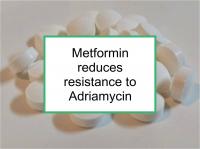Type 2 diabetes ("diabetes") is a well-established risk factor for breast cancer and its recurrence. High circulating glucose and insulin resistance both increase the risks. While obesity, which is also a breast cancer risk factor, is often associated with diabetes, it does not completely explain the association.
Even normal weight women with diabetes have an increased risk of breast cancer. Generally speaking, diabetics who use metformin, including during breast cancer treatment, experience better outcomes than those who do not. Now a new study has explained how metformin reduces breast cancer cell resistance to the chemotherapy drug doxorubicin.
Metformin and breast cancer in women with diabetes
Metformin treats type 2 diabetes by decreasing the production of glucose in the liver, enhancing the uptake of glucose in muscles, and reducing the level of blood glucose. Metformin also acts by increasing insulin sensitivity and reducing excess circulating insulin caused by insulin resistance. Most studies that have examined the association have reported that diabetic women taking metformin have a lower risk of breast cancer than those not treated with metformin. One study reported that perimenopausal and postmenopausal women treated with metformin for type 2 diabetes were 23% less likely to develop breast cancer than similar diabetic women not on metformin. Metformin reduces cancer cell proliferation, including breast cancer stem cell proliferation, in those with insulin resistance.
Extensive studies have reported anticancer effects of metformin in all breast cancer subtypes in the laboratory, including in chemotherapy-resistant cells. For example, metformin has been shown to improve survival of diabetic women with HER2 overexpressing (HER2+) breast cancer and suppress metastasis of triple negative breast cancer cells. Metformin has been shown to induce more favorable responses to both chemotherapy and radiotherapy.
Latest research demonstrates metformin reduces resistance
The study referenced above was designed to explain how metformin sensitizes multidrug resistant breast cancer cells to doxorubicin. To conduct the study, the authors first investigated oxidative stress and inflammatory-related pathways involved in doxorubicin resistance in MCF-7 (ER+/PR+) and MDA-MB-231 (triple negative) human breast cancer cells (designated the DOX-res group of cells). They then examined the metformin-associated cellular responses that resulted in the prevention of doxorubicin resistance (Met-DOX group).
DOX-res cells were found to have altered expression of genes involved in the transforming growth factor beta (TGF-β1) and oxidative stress signaling pathways. Disruption of the TGF-β signaling pathway, which regulates multiple cellular processes (including growth, division, proliferation and motility), has been seen in breast cancer. In-depth analysis of the TGF-β1 signaling pathway demonstrated that DOX-res cells developed adaptive responses, such as resistance against oxidative stress and apoptosis (programmed cell death). Metformin treatment modified gene expression in favorable directions. The Met-DOX cells were more sensitive to doxorubicin-induced oxidative stress. In addition, Met-DOX cells were more sensitive to apoptosis. The authors conclude that metformin is a promising tool for the prevention of doxorubicin chemoresistance in breast cancer patients.
Please see our article on doxorubicin effectiveness for more information.
